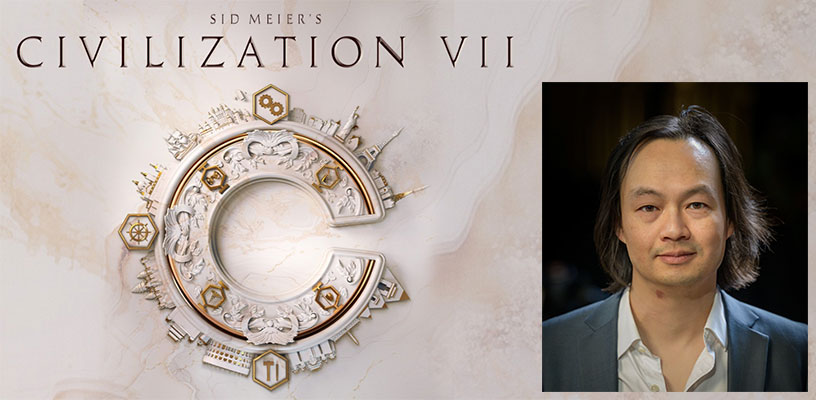Christopher Tin: from gaming to the concert hall

Composer Christopher Tin has won acclaim through his music for the Civilization series, including the first ever GRAMMY for a video game score. With the latest Civilization VII released, he discusses the challenges and rewards of writing music for games and how this can overlap with composition for the concert hall.
You composed Live Gloriously as the main choral theme for the recent Civilization VII game release. What is the text and what does the music depict?
The text is a composite of quotes from four ancient epics, all of which are centred around the theme of leaving your mark on history by accomplishing great things before you die. All four quotes are sung in their original languages: The Iliad (Ancient Greek), Beowulf (Old English), Popul Vuh (K'iche') and Ramayana (Sanskrit). The main these is the setting of Hector's quote from The Iliad, which reads:
LET ME NOT THEN DIE INGLORIOUSLY
AND WITHOUT A STRUGGLE,
BUT LET ME FIRST DO SOME GREAT THING
THAT SHALL BE TOLD AMONG MEN HEREAFTER.
As such, the whole piece has a bit of a 'falling down then rising up' feel, and the overall shape of the main theme mirrors this.
> Listen to the Live Gloriously theme
> Watch the Civilization VII opening cinematic
How has composing for games changed since Baba Yetu in Civilization IV, twenty years ago?
The biggest thing that I've noticed is the budgets. Game studios are able to shell out a lot of money to record a lot of music with live orchestra these days - a luxury not found in any other world really. I think also that the fan culture around video game soundtracks has exploded in recent decades. Video game themed concerts routinely sell out, and there are video game orchestras and performing ensembles sprouting up around the world, many of them purely a volunteer, community effort made up of passionate gamers and musicians. I was in the Washington DC area last summer and met with no fewer than three full video game-themed community orchestras. Some of these orchestras are enormous too - as many as 120 players. There's a real fandom around the music from video games, propelled by pure love of the art, that has been wonderful for composers like me to tap into.
How much now is writing to brief and how much is there creative freedom?
Ironically the Civilization team gave me way more creative freedom in the past than on this last game, Civilization VII. In the past, the development team would simply tell me how much music they needed and let me write what I wanted, which was the process that gave birth to Baba Yetu and Sogno di Volare (which are arguably my two best known pieces). With Civilization VII, we went through much more of a typical media composing process, where the developers gave me 'temp tracks' that they wanted me to emulate, gave me notes, asked me to rewrite sections, add additional texts, etc. It's not the way your typical concert music composer likes to work, but those of us who have a background in media scoring are used to this sort of thing; and frankly I think it's what has made me a better collaborator on things like opera and ballet projects.
How do you think Live Gloriously may become available for performance beyond the game?
I'm hoping it gets performed widely, and I'm thinking up ways in which to expand it - and the philosophical and literary themes that it contains - into a much bigger work... perhaps a cantata with orchestra, or even something operatic.
Your versatility has stretched to large-scale choral works and a recent completion of Puccini’s opera Turandot. What are your wider plans?
I've entered a new phase in my career where I'm starting to prioritize concert music projects over scoring games and films. I find it much more creatively rewarding, and can write music that wants to develop according to its own needs, and not what the needs of the game or film are. I've been fortunate, though, in that video games have given me an enormous audience that I might have never gotten had I been strictly a concert composer, and so I do still plan on composing for video games, particularly Civilization.
I also have to say that for those of us who love creative freedom in music, video games are the best form of media to be working in. Generally speaking games will give a composer a lot of creative freedom because the music is allowed to exist asynchronously to the picture. So there's no need to work around dialogue or sound effects, and you don't get those dreaded calls that you do in the film world, where it's two days before the orchestra sessions and the director has re-edited the movie, so you have to rewrite a bunch of music. Games have much more flexible delivery timelines and have a much deeper culture of celebrating the composer and giving them freedom to write the best music that they can. And so while in the future my output will be much heavier on the concert music side, I'll still keep putting out game music.
Interviewed by David Allenby (2025)
> Explore publications by Christopher Tin
> Christopher Tin at Boosey & Hawkes
> Visit Christopher Tin’s website
> Further information on Work: Live Gloriously - Civilization VII
